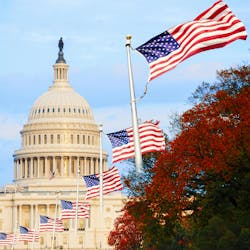NAHB Endorses Comprehensive Immigration Reform Legislation
Key Takeaways
- A bi-partisan bill in the House would create legal pathways for immigrant workers while protecting the nation's borders
- Program participants would support the American Worker Fund's retraining efforts
- NAHB and the U.S. Chamber of Commerce, among others, support the bill's passage
It has been nearly 40 years since President Ronald Reagan signed the Immigration Reform and Control Act (IRCA) into law, the nation’s last comprehensive immigration reform legislation.
Now, however, two members of Congress have introduced a bipartisan bill that would protect the nation’s borders and preserve its critical workforces. In July of this year, Reps. Maria Salazar (R-Fla.) and Veronica Escobar (D-Texas) introduced the “DIGNIDAD (Dignity) Act,” the most sweeping measure to address immigration since Reagan signed the IRCA in late 1986.
The National Association of Home Builders (NAHB) supports the legislation and has called on Congress to enact immigration reform. The Dignity Act addresses all of NAHB’s policy recommendations, specifically:
- Protecting the nation’s borders;
- Ensuring that employers continue to be responsible only for verifying the identity and work authorization of their direct employees, NOT the employees of their subcontractors;
- Creating new legal pathways for long-serving immigrant populations to continue working in the home building industry permanently. The home building industry risks an exacerbated skills gap if long-term workers with unique technical expertise are not given the opportunity to continue providing vital contributions to increase America’s housing supply;
- Maintaining investment in training America’s domestic workforce, including support for novel approaches that incentivize student participation in skilled trades training.
The Dignity Act pairs robust enforcement measures to curb illegal immigration with a fair and responsible pathway to permanent work authorization for certain undocumented workers.
It also provides the resources necessary to secure the nation’s borders and strengthen local law enforcement, and prioritizes American workers through the establishment of the American Worker Fund to retrain them to meet the needs of a changing economy. This focus on domestic workforce training ensures that investments in American workers remain a core part of the immigration conversation.
Preservation of the existing home building workforce is an important part of any reform effort. At a time of endemic labor shortages, home builders are acutely aware of the critical role immigrant labor plays in growing America’s housing supply. The Dignity Act acknowledges these realities, marrying accountability, workforce development, and respect for the rule of law.
The Dignity Act would create a new seven-year pathway to permanent work authorization for undocumented workers who meet clear and stringent criteria. Workers who had arrived in the United States prior to Dec. 31, 2020, must:
- Comply with federal and state laws;
- Complete a comprehensive criminal background check;
- Pay back taxes;
- Begin paying income taxes;
- Be gainfully employed or in school for at least four of the seven years; and
- Pay an annual restitution fee of $1,000 over the seven years of the program that will directly fund the American Worker Fund, developing the next generation of skilled American labor.
If these conditions are met, individuals will be granted a seven-year permanent and indefinitely renewable work and travel authorization, as well as protection from removal proceedings. However, this status cannot be leveraged to apply for lawful permanent residency.
In addition to NAHB and the U.S. Chamber of Commerce the bill has more than 20 co-sponsors in the U.S. House of Representatives. Even so, it appears its passage will be a long-term process.
“This bill takes a common-sense approach to the immigration challenges impacting our industry,” says Sam Gilboard, federal legislative director at NAHB. “This is a strong piece of legislation, but it won’t become law overnight.”
